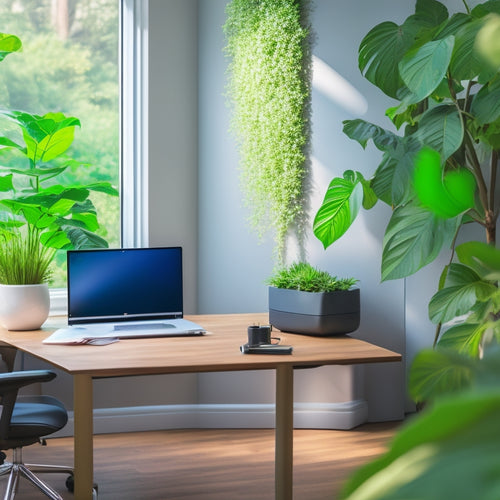
10 Best Sustainable Waste Management Solutions for Green Homes
Share
You're likely unaware that the average green home generates over 2 kilograms of waste daily, but with the right sustainable waste management solutions, you can reduce this output by up to 90% and create a more eco-friendly living space. Composting toilets, greywater systems, and anaerobic digestion are just a few solutions that can greatly minimize waste. You can also investigate vermicomposting, bokashi composting, and green bin composting to recycle organic waste into nutrient-rich fertilizers. Additionally, consider recycling systems, waste-to-energy conversion systems, and compostable bags to further reduce your environmental footprint. As you investigate these solutions, you'll uncover even more ways to change your waste management approach and create a greener, more sustainable home.
Key Takeaways
- Composting toilets and vermicomposting systems reduce waste output and create nutrient-rich soil for gardening.
- Greywater systems recycle wastewater for irrigation, promoting water conservation and sustainable landscaping.
- Waste reduction methods like source separation, minimalism, and upcycling minimize waste generation and environmental impact.
- Compostable bags and anaerobic digestion systems convert organic waste into valuable resources like compost and biogas.
- Innovative toilet solutions like incinerating toilets and eco-friendly toilet systems reduce water consumption and sewage output.
Composting Toilets for Waste Reduction
One of the most effective ways to reduce waste in green homes is by installing composting toilets, which can redirect up to 30% of household waste away from landfills and sewage systems.
By choosing a composting toilet, you'll not only reduce your environmental footprint but also enjoy significant composting benefits, such as creating nutrient-rich soil for your garden.
Additionally, incorporating renewable energy solutions like solar panels or biodiesel fuel systems can further minimize your carbon footprint.
To guarantee ideal performance, regular toilet maintenance is vital. This involves adding bulking agents like sawdust or coconut coir to balance moisture levels and mixing the compost regularly.
By doing so, you'll minimize odors and maintain a healthy composting process.
With proper upkeep, composting toilets can be a transformative option for eco-conscious homeowners seeking to minimize their waste output.
Greywater Systems for Irrigation
By embracing composting toilets, you're already taking a significant step towards reducing your waste output.
Now, consider taking it to the next level with greywater systems for irrigation. These systems recycle greywater (wastewater generated from sinks, showers, and washing machines) for irrigation, promoting water conservation and sustainable landscaping.
By adopting renewable energy sources, such as solar charging solutions, you can further reduce your carbon footprint and energy costs.
Greywater recycling increases irrigation efficiency, reduces potable water usage, and supports eco-friendly irrigation practices. It also enhances soil health, as the nutrient-rich water promotes garden health and fertility.
Proper greywater treatment and system installation are vital to guarantee the water is safe for your garden.
Regular maintenance tips include monitoring water quality, checking for clogs, and performing routine inspections to make certain your system runs smoothly.
Anaerobic Digestion for Biogas
Your commitment to sustainable living is further solidified with the integration of anaerobic digestion for biogas production. This innovative technology leverages the power of anaerobic bacteria to break down organic feedstock, generating a significant source of renewable energy.
By offsetting grid reliance through on-site renewable energy generation, you can reduce your operational costs and carbon footprint, contributing to a sustainable future solar power integration.
The digestion process occurs in the absence of oxygen, resulting in the production of biogas, primarily composed of methane and carbon dioxide. This biogas can be employed for energy generation, offsetting your reliance on fossil fuels and reducing your environmental impact.
With ideal digestion efficiency, you can maximize methane recovery, creating a sustainable agriculture model that closes the nutrient loop.
Recycling Systems for Organic Waste
As you investigate sustainable waste management solutions, recycling systems for organic waste emerge as an essential component of a green home's ecosystem.
By leveraging solar-powered charging solutions, you can reduce your reliance on traditional energy sources and minimize your carbon footprint.
You'll want to implement effective composting methods to process kitchen scraps and food scraps, which can be converted into nutrient-dense organic fertilizers.
Proper waste segregation is key to successful composting, ensuring that only organic materials enter the process.
Regular compost maintenance is necessary to optimize nutrient cycling and prevent unpleasant odors.
The resulting compost can be used to enhance soil, reducing the environmental impact of synthetic fertilizers.
You can even brew compost tea, a liquid solution that promotes healthy microbial activity in your soil.
Vermicomposting for Food Waste
You'll start vermicomposting by setting up a bin that provides a comfortable environment for your worms, which includes adequate ventilation, darkness, and a consistent temperature between 55°F and 77°F.
To keep your worms happy and healthy, you'll need to maintain ideal moisture levels, ensuring the bedding is damp like a wrung-out sponge.
By adopting renewable energy solutions, such as solar panels, you can power your vermicomposting system sustainably.
Once your worms have broken down the organic matter, you'll be ready to harvest the nutrient-rich worm castings, a beneficial fertilizer for your garden or indoor plants.
Setting Up Bin
How efficiently can you process food waste in your green home? Setting up a vermicomposting bin is an essential step in sustainable waste management.
Start by selecting a suitable location for your bin, ensuring it's well-ventilated and accessible. Next, choose the right type of bin, considering factors like size, material, and aeration.
Proper waste segregation is key, so educate yourself on what can and can't be composted. Implementing sustainable fuel options like electrification can also reduce greenhouse gas emissions.
You'll need to balance green waste (food scraps, tea bags) with brown waste (dried leaves, shredded paper). Aim for a mix of 2/3 brown waste and 1/3 green waste.
Add red wiggler worms, which will break down organic matter into nutrient-rich compost. With regular maintenance, you'll be recycling food waste like a pro, reducing your environmental footprint and creating a beneficial resource for your garden.
Maintaining Moisture Levels
About 70% of the worm bin's volume should be comprised of moisture-rich organic matter, with the ideal moisture level resembling a damp sponge.
You'll want to maintain this level to guarantee peak worm activity and decomposition. To achieve this, you can add materials with high moisture retention, such as fruit and vegetable scraps, tea bags, and coffee grounds.
Avoid adding dry materials like newspaper and cardboard, as they can absorb excess moisture. Regularly checking the moisture level by squeezing a handful of the mixture will help you determine if it's too dry or too wet.
Proper soil hydration is essential, as it enables the worms to move freely and break down organic matter efficiently.
Harvesting Worm Castings
After several weeks of feeding your worms a balanced diet and maintaining ideal moisture levels, the time has come to reap the rewards of your labor: harvesting worm castings, also known as vermicompost. This nutrient-dense natural fertilizer is a transformative element for your garden. Worm castings promote soil enhancement, support nutrient cycling, and serve as eco-friendly fertilizers. They also aid in pest control, nurturing a balanced ecosystem.
| Worm Castings Benefits | Garden Application | Environmental Impact |
|---|---|---|
| Rich in micronutrients | Use as a natural fertilizer | Reduces synthetic fertilizer use |
| Improves soil structure | Enhances plant growth | Lowers environmental pollution |
| Supports beneficial microbes | Increases crop yields | Encourages sustainable gardening |
Incinerating Toilets for Sanitation
You're likely familiar with traditional toilet systems that rely on water and sewage infrastructure, but incinerating toilets offer a unique solution for sustainable sanitation.
By reducing waste volume and eliminating the need for water, these eco-friendly toilet systems can greatly minimize your environmental footprint.
When selecting an incinerating toilet, consider the waste reduction methods that best fit your green home's needs.
Waste Reduction Methods
Embracing sustainable waste management solutions in green homes begins with effective waste reduction methods.
You can start by practicing source separation, using reusable containers to categorize waste.
Adopting minimalism practices and mindful consumption habits will greatly reduce waste generation.
Engage in upcycling projects, community sharing, and digital decluttering to give old items a new life.
Cultivate a repair culture and make conscious purchasing decisions, opting for eco-friendly packaging whenever possible.
By implementing these strategies, you'll reduce waste, conserve resources, and minimize your carbon footprint.
Eco-Friendly Toilet Systems
As you investigate eco-friendly toilet systems, incinerating toilets emerge as a viable solution for sustainable sanitation.
These innovative systems use electricity or gas to incinerate human waste, reducing water consumption and minimizing sewage output. Incinerating toilets offer an attractive alternative to traditional dual flush toilets, which still require a considerable amount of water for flushing.
By choosing an incinerating toilet, you can greatly reduce your water footprint and minimize the energy required for wastewater treatment.
Additionally, the ash residue produced by incinerating toilets can be repurposed as fertilizer, providing composting benefits for your garden or yard.
This closed-loop system promotes a more circular and sustainable approach to waste management in your green home.
Bokashi Composting for Fermentation
By incorporating bokashi composting into your green home's waste management strategy, you can efficiently ferment organic matter and reduce your environmental footprint.
This innovative approach utilizes microorganisms to break down food waste, resulting in a nutrient-rich fertilizer for your garden. The bokashi benefits are twofold: it reduces waste sent to landfills and produces a useful resource for your yard.
The fermentation process involves adding microbe-rich bokashi bran to organic waste, which is then sealed in an airtight container to ferment. After a few weeks, the fermented matter can be added to your compost pile or used as fertilizer.
Compostable Bags for Waste Disposal
When you switch to compostable bags for waste disposal, you'll have a range of biodegradable material options to choose from, ensuring a significant reduction in plastic waste.
These bags are specifically designed to facilitate an easy composting process, allowing you to efficiently turn organic waste into nutrient-rich soil.
Biodegradable Material Options
Tackling waste disposal in an eco-friendly manner requires exploring innovative solutions, like compostable bags made from biodegradable materials.
You can switch to biodegradable packaging, plant-based materials, and compostable utensils that reduce organic waste.
Sustainable fabrics, eco-friendly disposables, and natural fibers can replace traditional materials in your green home.
In green construction, you can use biodegradable materials for insulation, reducing waste and promoting sustainability.
Edible cutlery and zero waste products are also gaining popularity, providing alternatives to traditional plastic utensils and packaging.
Reducing Plastic Waste
Your daily waste disposal routine can greatly impact the environment, and switching to compostable bags is an essential step towards reducing plastic waste. By adopting eco-friendly alternatives, you're contributing to a zero-waste lifestyle and promoting a circular economy. Community initiatives, educational campaigns, and mindful consumption practices can further support this effort.
| Initiative | Description | Impact |
|---|---|---|
| Compostable Bags | Replace traditional plastic bags with biodegradable options | Reduces plastic waste, promotes sustainable shopping |
| Refill Stations | Implement reusable containers for household items | Encourages sustainable consumption, reduces packaging waste |
| Upcycling Projects | Alter waste materials into new products | Nurtures creativity, reduces waste, and promotes eco-friendly practices |
Easy Composting Process
By switching to compostable bags, you're taking a significant step towards reducing plastic waste.
These eco-friendly bags allow you to collect kitchen scraps and other organic waste, which can then be converted into nutrient-rich compost for your garden.
The compost benefits are numerous, including improved soil structure, increased crop yields, and reduced reliance on synthetic fertilizers.
To make the composting process easy, simply collect your waste in the compostable bags and deposit them into your compost bin.
The bags will break down naturally, leaving you with a precious resource for your garden.
Green Bin Composting for Kitchen Waste
Kitchen scraps, a significant contributor to landfill waste, can be diverted and converted into a useful resource through green bin composting. By adopting this practice, you'll reduce your environmental footprint and create a nutrient-rich soil amendment for your garden.
To get started, set up a compost bin or container specifically designed for kitchen scraps. Add a mix of "green" organic matter like food waste and "brown" materials like dried leaves or twigs.
- Monitor moisture levels to maintain a balance between dry and wet conditions
- Turn the compost pile regularly to facilitate aeration and microorganism activity
- Avoid adding meat, dairy, or oily foods that can attract pests and create unpleasant odors
Waste-to-Energy Conversion Systems
Advanced waste-to-energy conversion systems offer a promising solution for managing non-recyclable waste, leveraging state-of-the-art technology to generate electricity, heat, or fuel from organic materials.
You'll be intrigued to know that waste conversion processes can reduce environmental impact by up to 90%. Furthermore, energy recovery through waste-to-energy systems can power entire communities, reducing reliance on fossil fuels.
As you investigate these systems, consider factors like system efficiency, technology advancements, and policy implications. Community engagement is essential, as public awareness and education can increase adoption rates.
Additionally, conduct a thorough cost analysis to understand operational challenges and feasibility. By embracing waste-to-energy conversion systems, you can considerably reduce your carbon footprint and contribute to a more sustainable future.
Frequently Asked Questions
What Are the Costs Associated With Implementing Sustainable Waste Management Systems?
When you implement sustainable waste management systems, you'll face an initial investment, but you'll reap long-term savings through reduced waste disposal costs, lower energy consumption, and potential revenue from recyclables and compost.
How Do I Maintain and Clean My Sustainable Waste Management Systems?
You'll want to regularly inspect and clean your sustainable waste management systems to guarantee peak performance. For compost maintenance, turn piles regularly and add bulking agents; for recycling, follow recycling tips like rinsing containers and removing labels to maximize efficiency.
Are Sustainable Waste Management Systems Suitable for Small Living Spaces?
You'll find sustainable waste management systems suitable for small living spaces, as they offer flexibility; composting benefits include space-efficient designs, while recycling challenges are mitigated by compact, innovative solutions that maximize output in minimal areas.
Can I Integrate Multiple Sustainable Waste Management Systems in One Home?
You can harmoniously merge multiple sustainable waste management systems, like community composting and recycling education, in your home, creating a seamless, eco-friendly flow that enables you to take control of your waste, nurturing a liberated lifestyle.
Do Sustainable Waste Management Systems Require Special Permits or Licenses?
You'll need to research local regulatory requirements, as they vary, to determine if special permits or licenses are necessary for your sustainable waste management system, ensuring its environmental impact aligns with regional standards and regulations.
Related Posts
-

What Does Your Home Energy Audit Report Reveal?
Your home energy audit report reveals a detailed analysis of your energy consumption patterns, highlighting areas of ...
-

10 Best Energy-Efficient External Hard Drives for Sustainable Offices
When it comes to sustainable offices, you need external hard drives that balance data storage needs with energy effic...
-

Transform Your Outdoor Space With Recycled Plastic Lumber
By incorporating recycled plastic lumber into your outdoor design, you're not just building a deck or installing a fe...


